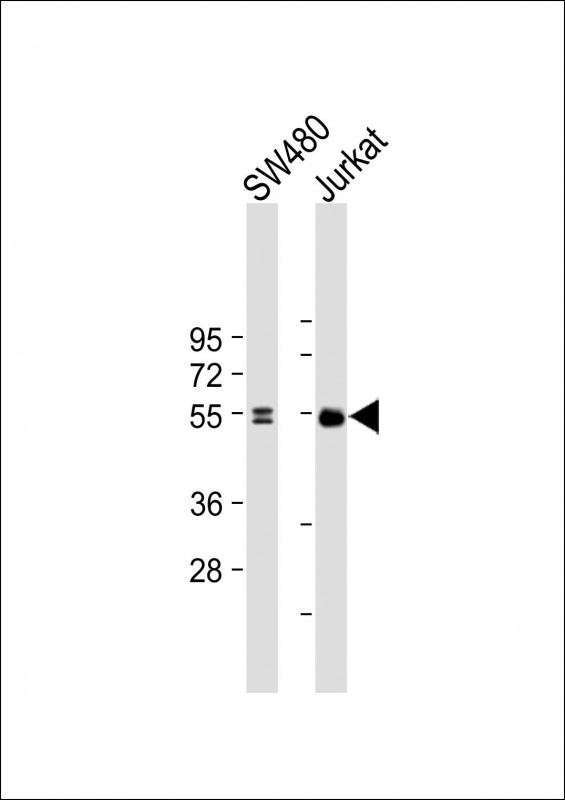
Mouse Anti-LEF1 antibody
lymphoid enhancing factor-1; Transcription factor T cell specific 1 alpha ; DKFZp586H0919; LEF 1; LEF1; Lymphoid enhancer binding factor 1; T cell specific transcription factor 1 alpha; TCF 1 alpha; TCF1 alpha; TCF1alpha; TCF1-alpha; LEF1_HUMAN; Lymphoid
View History [Clear]
Details
Product Name LEF1 Chinese Name 淋巴增强因子-1单克隆抗体 Alias lymphoid enhancing factor-1; Transcription factor T cell specific 1 alpha ; DKFZp586H0919; LEF 1; LEF1; Lymphoid enhancer binding factor 1; T cell specific transcription factor 1 alpha; TCF 1 alpha; TCF1 alpha; TCF1alpha; TCF1-alpha; LEF1_HUMAN; Lymphoid enhancer-binding factor 1; T cell-specific transcription factor 1-alpha. Research Area Tumour Developmental biology Chromatin and nuclear signals Stem cells transcriptional regulatory factor Epigenetics Immunogen Species Mouse Clonality Monoclonal Clone NO. F11A3 React Species (predicted: Human, ) Applications WB=1:500-2000
not yet tested in other applications.
optimal dilutions/concentrations should be determined by the end user.Theoretical molecular weight 44kDa Cellular localization The nucleus Form Liquid Concentration 1mg/ml immunogen Recombinant human LEF-1 between 95-283 amino acids. Lsotype IgG1,κ Purification affinity purified by Protein G Buffer Solution 0.01M TBS(pH7.4) with 1% BSA, 0.03% Proclin300 and 50% Glycerol. Storage Shipped at 4℃. Store at -20 °C for one year. Avoid repeated freeze/thaw cycles. Attention This product as supplied is intended for research use only, not for use in human, therapeutic or diagnostic applications. PubMed PubMed Product Detail This gene encodes a transcription factor belonging to a family of proteins that share homology with the high mobility group protein-1. The protein encoded by this gene can bind to a functionally important site in the T-cell receptor-alpha enhancer, thereby conferring maximal enhancer activity. This transcription factor is involved in the Wnt signaling pathway, and it may function in hair cell differentiation and follicle morphogenesis. Mutations in this gene have been found in somatic sebaceous tumors. This gene has also been linked to other cancers, including androgen-independent prostate cancer. Alternative splicing results in multiple transcript variants. [provided by RefSeq, Oct 2009].
Function:
Participates in the Wnt signaling pathway. Activates transcription of target genes in the presence of CTNNB1 and EP300. May play a role in hair cell differentiation and follicle morphogenesis. TLE1, TLE2, TLE3 and TLE4 repress transactivation mediated by LEF1 and CTNNB1. Regulates T-cell receptor alpha enhancer function. Binds DNA in a sequence-specific manner. PIAG antagonizes both Wnt-dependent and Wnt-independent activation by LEF1 (By similarity). Isoform 3 lacks the CTNNB1 interaction domain and may be an antagonist for Wnt signaling. Isoform 5 transcriptionally activates the fibronectin promoter, binds to and represses transcription from the E-cadherin promoter in a CTNNB1-independent manner, and is involved in reducing cellular aggregation and increasing cell migration of pancreatic cancer cells. Isoform 1 transcriptionally activates MYC and CCND1 expression and enhances proliferation of pancreatic tumor cells.
Subunit:
Binds the armadillo repeat of CTNNB1 and forms a stable complex. Interacts with EP300, TLE1 and PIASG (By similarity). Binds ALYREF/THOC4, MDFI and MDFIC. Interacts with NLK.
Subcellular Location:
Nucleus. Note=Found in nuclear bodies upon PIASG binding.
Tissue Specificity:
Detected in thymus. Not detected in normal colon, but highly expressed in colon cancer biopsies and colon cancer cell lines. Expressed in several pancreatic tumors and weakly expressed in normal pancreatic tissue. Isoforms 1 and 5 are detected in several pancreatic cell lines.
Post-translational modifications:
Phosphorylated at Thr-155 and/or Ser-166 by NLK. Phosphorylation by NLK at these sites represses LEF1-mediated transcriptional activation of target genes of the canonical Wnt signaling pathway.
DISEASE:
Defects in BRCA2 are a cause of susceptibility to breast cancer (BC). A common malignancy originating from breast epithelial tissue. Breast neoplasms can be distinguished by their histologic pattern. Invasive ductal carcinoma is by far the most common type. Breast cancer is etiologically and genetically heterogeneous. Important genetic factors have been indicated by familial occurrence and bilateral involvement. Mutations at more than one locus can be involved in different families or even in the same case. Defects in BRCA2 are the cause of pancreatic cancer type 2 (PNCA2) [MIM:613347]. It is a malignant neoplasm of the pancreas. Tumors can arise from both the exocrine and endocrine portions of the pancreas, but 95% of them develop from the exocrine portion, including the ductal epithelium, acinar cells, connective tissue, and lymphatic tissue.
Similarity:
Belongs to the TCF/LEF family.
Contains 1 HMG box DNA-binding domain.
SWISS:
Q9UJU2
Gene ID:
51176
Database links:Entrez Gene: 51176 Human
Omim: 153245 Human
SwissProt: Q9UJU2 Human
Unigene: 726506 Human
Product Picture
Bought notes(bought amounts latest0)
No one bought this product
User Comment(Total0User Comment Num)
- No comment



 +86 571 56623320
+86 571 56623320




